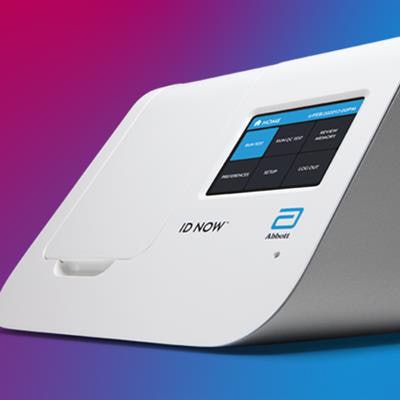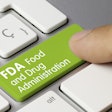
Abbott's newly approved ultrarapid molecular point-of-care (POC) test for the novel coronavirus featured prominently in the White House's coronavirus task force press briefing on March 29 outlining the government's current pandemic strategy.
The U.S. Food and Drug Administration (FDA) granted an emergency use authorization (EUA) for the polymerase chain reaction (PCR) molecular POC test on March 27. The assay provides positive results in as little as five minutes and negative results in 13 minutes, according to the company.
The test runs on Abbott's ID Now instrument, which weighs 6.6 lb and can be used in a variety of healthcare environments, including physician offices, urgent care clinics, and hospital emergency departments, Abbott said.
President Donald Trump opened the March 29 press briefing by hailing the speed of the FDA's approval of the test, noting that it took the agency only four weeks instead of 10 months to review the product. Abbott has been working around the clock to develop the product, which delivers "lightning fast results," Trump said.
"That's a whole new ballgame," the president said.
The biggest priorities for testing are healthcare workers, hospitals, and nursing homes.
"The deployment of rapid testing will vastly accelerate our ability to monitor, track, contain, and ultimately defeat the virus," Trump said.
Abbott noted that the ID Now platform is widely used in the U.S. in urgent healthcare settings: COVID-19 joins tests for influenza A/B, Streptococcus A, and respiratory syncytial virus (RSV). The company pledged to start shipping coronavirus tests this week, with a target of ramping up to 50,000 per day.
The test benefits from a strong installed base of 18,000 systems in the U.S. and an easy-to-use design, said Bruce Carlson, publisher of market research firm Kalorama Information, a sister company of LabPulse.com. It's also the fastest PCR test approved to date, he noted.
The FDA also recently granted an EUA for Abbott's SARS-CoV-2 test that runs on the company's high-capacity m2000 PCR system, which is installed at hospitals and reference labs.
"Between the two platforms, Abbott expects to produce about 5 million tests per month," the company said.
The FDA noted in a March 30 statement that it has worked with more than 230 test developers since January on emergency use authorizations; to date, 20 have been granted.
"There's been a rapid-fire pace to approvals of COVID-19 assays lately, but each is important," Carlson commented. "Because labs, physician offices, and clinics have so many different vendor test systems, each approval means more labs can open up to testing."
In its statement, the FDA said that in addition to the EUAs that have been granted, more than 110 laboratories have notified the agency that they have begun to use their own tests.
"For interested developers, the FDA provided recommendations for how to check a test for accuracy as well as a short form to make it easy to share their test information quickly in support of an [EUA]," the FDA said.
The American Clinical Laboratory Association (ACLA) said that its members have been steadily increasing testing since the agency removed regulatory barriers for doing so one month ago. Overall, members have performed approximately 650,000 tests, but demand for testing has also been growing, the ACLA noted in a statement. In light of the demand, doctors and hospitals must prioritize testing for those who need it most, in accordance with guidelines from the U.S. Centers for Disease Control and Prevention.



















